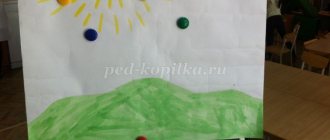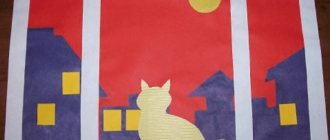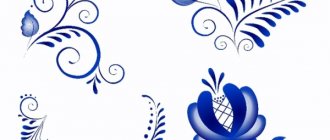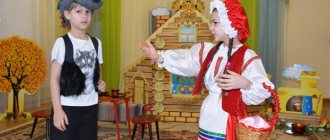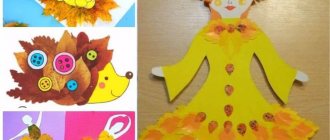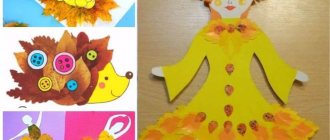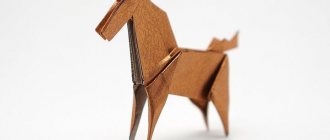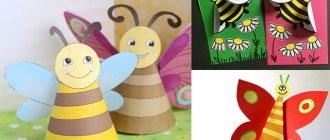Applications are a very popular form of creativity for children. The activity will be interesting for even a young child. The baby will be indifferent to drawing or modeling, but he will definitely be interested in cutting out figures and gluing them. Autumn applications look especially beautiful . Next, the application of autumn leaves will be presented; the preparatory group of the kindergarten will be able to cope with this master class.
Application “Autumn Leaves”
photo 1
In order to complete this master class, you need:
- scissors
- colored paper
- pencil
- leaf outline templates
photo 2
The technique can be compared to the technique of cutting out snowflakes. First you need to take a sheet of green paper.
photo 3
It is folded in half and a triangle is obtained.
photo 4
After this, the triangular-shaped workpiece is folded in half twice more.
photo 5
photo 6
At this stage you need to apply a template of an oak leaf image.
photo 7
This sheet is traced along the contour using a simple pencil.
photo 8
photo 9
Appliquing autumn trees from paper is quite simple. In order to make a birch leaf, it is better to take a yellow sheet of paper. The sheet is folded in exactly the same order.
photo 10
It is necessary to trace the outline of the leaf according to the template and cut it out.
photo 11
photo 12
In order to cut out a maple leaf, you need to take an orange sheet of paper.
photo 13
It is folded in the sequence indicated above.
photo 14
A maple leaf template is applied to the workpiece, folded in half, traced, and cut out.
photo 15
After this, the leaves are unfolded and glued to paper. Even an adult will like this version of autumn snowflakes. The craft will be an excellent decoration for a kindergarten room.
MAGAZINE Preschooler.RF
Summary of a lesson in a preparatory group on artistic and aesthetic education using non-traditional drawing techniques on the topic: “Late Autumn”Completed by the teacher of MBDOU d/s No. 17 “Kolobok”
g.-k. Anapa Gamretskaya Anna Sergeevna
Program content:
- Introduce children to the painting “Golden Autumn”
. - Strengthen the ability to draw using various non-traditional techniques (raw drawing, blowing, sponging, placing the image across the entire sheet.
- Cultivate interest in the visual arts, the ability to see the beauty of nature.
- Develop creativity, imagination, and the ability to navigate on a sheet of paper.
Technologies used: COR, health-saving.
Material and equipment:
Painting by I. Levitan “Golden Autumn”
, sheets of tinted paper, gouache, palette, blowing tubes, napkins, foam sponge.
Progress of the lesson:
- Look out the window. What time of year is it now? (autumn)
. Why?
What signs of autumn do you know?
Yes, it's autumn now. Almost all the leaves have fallen off. Today I went to kindergarten, the leaves rustled pleasantly under my feet. I wanted to pick up a leaf and bring it here. This leaf turned out to be not ordinary, but mysterious.
Listen to the riddle:
The face of nature is getting darker and darker: The vegetable gardens are turning black, the forests are becoming bare, the bird voices are falling silent,
The bear fell into hibernation. What month did it come to us?
(november)
- That's right, this is the third month of autumn. What other autumn months do you know?
I. Introductory part.
Look at the board, what do you see here? These are reproductions of paintings. Which of these paintings depicts autumn? This painting by Issak Ilyich Levitan, which is called “Golden Autumn”
.
What do you see on it? (nature)
. There are other paintings here, too.
Issak Ilyich Levitan, who painted this picture, was very fond of painting nature. He was a famous artist.
Tired? Let's take a little rest.
Physical exercise.
Imagine that we are in the autumn forest and walking along the paths. So we stopped and:
Hands raised and shook These are trees in the forest. Arms bent, hands shaken
The wind knocks down the dew To the side of the hand, Let's wave it smoothly These are the birds flying south.
We will also show how they sit down. The wings are folded back.
II. Main part
— Guys, imagine that you are all artists. If we are artists, what do we do? (paint)
How? What can we draw with?
- What will help us? (our assistant is a tube)
What can you draw with it?
(trees)
.
How? (this technique is blowing)
.
- Let's start drawing.
Independent work of children. Individual assistance to those who are not quite doing well.
- Look at your paintings, what did you get? What was the mood of the painting? It's very sad, isn't it? Why? (the trees stand without their elegant golden dresses)
.
What are the trees' dresses made of? (leaves)
Our magic sponge will help us with this.
How? (technique – sponge painting)
III. Final part
- What did we draw today? How? (technicians)
Let's make a huge forest out of all your paintings.
Bring all your work here. What a beautiful, magical, elegant autumn forest it turned out to be. All the trees in this forest are very beautiful. Do you like the autumn forest? (yes)
And I really like it! That's what good artists you are!
| Next > |
Application “Magic autumn”
Children love to watch nature. And they probably note that the trees dress in unusual outfits. Next, work will be presented that develops not only fine motor skills, but also observation, imagination, and fantasy. Since the autumn application is simple, the kindergarten preparatory group performs it independently, under the supervision of a teacher. The following materials will be required:
- blue printing paper,
- multi-colored printing paper,
- marker,
- glue.
First you need to take blue paper and a marker. Use a marker to draw a tree trunk and branches. Most often, students are asked to draw a birch tree. Next, the silhouettes of the leaves are cut out. The leaves are glued using a glue stick.
photo 16
You need to start creating a crown from the bottom. Next, a layer of leaves is glued closer to the tree trunk. But glue should only be applied to the edge of the leaf. Work continues until the entire tree trunk is completely covered.
photo 17
All that remains is to wait until the work dries.
photo 18
Progress of the lesson.
The teacher asks a riddle:
I bring the harvests, I sow the fields again, I send the birds to the south, I strip the trees, But I don’t touch the pines and fir trees, I... (Autumn)
- Right. Today our lesson will be related to this time of year. Listen to the poem and say what natural phenomenon it is about.
The leaves were filled with sunshine. The leaves are soaked in the sun. They filled up, became heavy, and flew in the wind, rustled through the bushes, galloped over the twigs, the wind swirls gold, makes noise like golden rain! (M. Lesovaya)
- That's right, it's about leaf fall. Let's look carefully at the leaves and think about which trees they came from (examining the leaves of maple, rowan, birch, oak, aspen, linden).
Notes on drawing “Falling leaves are spinning”
Kristina Figurova
Notes on drawing “Falling leaves are spinning”
Goal: Expand children's understanding of the natural phenomenon of leaf fall . To develop the ability to paint with a brush , using the “dipping”
.
- expand and activate vocabulary ( leaf fall , maple leaves , method of “dipping”
)
- fix the names of the colors (yellow, red, orange)
- continue to learn how to use a brush, paint using the “dipping”
— cultivate accuracy in working with paints;
Means of implementation: dry autumn leaves , illustrations of autumn phenomena
nature ( leaf fall , album sheets depicting a tree trunk, brushes, red gouache,
yellow flowers, napkins, containers with water, a hat with autumn leaves , a CD with music
Tchaikovsky's Seasons.
leaf fall , looking at illustrations on an autumn theme, conversations on autumn themes,
observing autumn changes in nature while walking, observing leaf fall , collecting
leaves.
Progress of the lesson
— Guys, look what I brought you today (showing different plant leaves )
.
- What kind of trees do you think these leaves are ?
I show the leaves and tell what kind of tree this leaf is and so on, all 3 types .
- Why do you think I brought them to you? And what are we going to do with them?
- Guys, today I want to teach you a little magic. Want to? Look carefully and think about what or who these tree leaves and flowers could become ?
— I want to teach you how to use crayons (pencils)
and
leaves to depict a butterfly , turtle and cockroach.
Look, it's very simple.
To begin with, I take a leaf of lilac , lay it on a clean sheet of paper and trace it along the contour, then I finish drawing the head , paws and tail. Does it look like a turtle? Now all that remains is to carefully paint it .
Now, using leaf , you can depict a cockroach. The same thing, I attached the piece of paper to a sheet of paper , traced the outline of the cherry leaf finished drawing the head and paws. Did it turn out to be a cockroach?
How to depict a butterfly? For the butterfly wings we will need oak leaves , we only need two of them. Placing the piece of paper with the top to the right, she traced it around the office. Then she also placed the sheet opposite to the left side, leaving a little space, and circled it again. These turned out to be wings. Now all that remains is to draw the body, head and antennae between the wings. Did you get a butterfly? But now you can carefully color .
Now, guys, I offer you this magic of turning leaves into living creatures and perform it for you 3 types of plant leaves for children to choose from )
.
At the end of the lesson, I summarize the results and note the most interesting, beautifully arranged , well-colored works.
Summary of joint activities “How to become a star?” (preparatory group). Goal: in the process of joint activity, create a creative improvisation “Musical Number” for performance in front of the audience. Tasks:. Notes for a drawing lesson “Autumn Maple” (preparatory group) Notes for a lesson in the educational field “Artistic and Aesthetic Development” drawing on the theme “Autumn Maple” (preparatory group). Summary of a lesson on drawing with non-traditional techniques “Autumn Forest” (preparatory group) Program content: • Arouse interest in creating a collective composition “Autumn Forest” • Introduce children to a new type of non-traditional. What does an autumn leaf look like? Before we knew it, autumn was on the doorstep again. Once again, there is a wealth right under your feet that can be used for crafts with children. Leaves.
Autumn matinee (preparatory group) Autumn matinee. Preparatory group. Entrance with leaves, in a semicircle. Poems: 1. The summer flew by quickly like a migratory bird into the distance. Autumn is wonderful.
Drawing from life “A leaf flew from a birch tree” (older age) Drawing a birch tree from life. “A leaf has flown from a birch tree...” Purpose of the lesson: 1. To develop curiosity, observation, and the desire to reflect.
Children's creativity on the topic: “Imagine what an autumn leaf can become” Children's creativity on the topic: “Imagine what an autumn leaf can become” Nature is fabulous and rich. What a variety of feelings overwhelm you.
Essay “What can music tell you?” What can music tell us? Music is the most mysterious of all arts. She is able to express the subtlest movements of the soul, beyond control.
Source
Notes on drawing “Falling Leaves”
Anastasia Elksnit
Notes on drawing “Falling Leaves”
Lesson summary " Leaf fall "
Summary of a drawing lesson on the topic : “ Leaf fall ”
Goal: To teach to convey the beauty of the surrounding nature.
Objectives: Develop aesthetic perception, form imaginative ideas. Teach children to hold the brush correctly, dip the entire bristles into the paint, and remove excess drops on the edge of the jar. Cultivate accuracy when working with paints.
Equipment: white gouache paints for each table, herbarium leaves , brush.
1. Organizational moment.
Children are part of a group; there are autumn leaves .
Finger gymnastics: “Wind and leaves ”
The wind flew through the forest
The wind counted the leaves
Here is rowan - carved
Here from a birch tree - golden
Here is the last leaf from the aspen tree
The wind blew it onto the path.
V. - Now collect the leaves that you liked and go to the tables, we will paint these leaves .
During work, I provide individual assistance, make sure that children hold the brush correctly, and remind them of the rules of drawing .
the finished and dried leaves onto a thread and decorate the door to the reception area.
Summary of a lesson on unconventional drawing using the technique of dabbing in the second junior group “Falling Leaves” Fine arts in the second junior group “Falling Leaves” Author: Dinmukhametova Florida Yalalovna Location: Kyshtym village Northern Goal: Educate children.
Summary of an integrated drawing lesson “Falling Leaves” in the first junior group Hypothesis: If you influence the child’s feelings with the help of cognitive activity, visual creativity, then it is possible to form.
Summary of educational activities on drawing using the method of dipping with children of the second junior group on the topic “Leaf Fall” Synopsis of direct educational activities on artistic and aesthetic development with children of the second junior group 4. Physical education.
Notes on drawing in the middle group on the topic “Falling Leaves” Topic: “Falling Leaves”. Goal: To create conditions for enriching children’s sensory experience and their ideas about the diversity of natural phenomena. Software.
